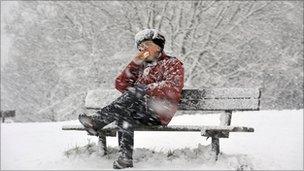Poorest pensioners face 'heat or eat' concern
- Published
- comments
The country's poorest pensioners are having to cut back on food in order to pay for heating
The poorest pensioner households cut their food spending during very cold spells of weather to cover the cost of heating, a report has said.
The Institute for Fiscal Studies (IFS) said that all retired households raised fuel spending by 7% during cold snaps.
The poorest quarter of pensioner households also decreased their food spending by a similar proportion during the same period.
The report comes the day after Scottish Power announced it was to raise prices.
The utility company is to raise the cost of gas by 19% and the cost of electricity by 10% from 1 August, affecting 2.4 million households in the UK.
Naming effect
The IFS, in a separate report published simultaneously, said that older people spent an average of 41% of their winter fuel payment on heating bills.
The institute concluded that describing the benefit as a winter fuel payment encouraged recipients to spend more of the money on heating bills.
If the income of a pensioner household is increased by £100, they will increase their spending on fuel by £3. However, if that increase is labelled as a winter fuel payment then £41 will go on fuel, the report concluded.
The annual winter fuel payment can be between £100 and £300 depending on the recipient's situation. Most people born on or before 5 January 1951 will be entitled to the payment during the forthcoming winter.
It is aimed to help pay the increased heating bills of winter, but recipients are not obliged to spend it in that way.
"The winter fuel payment was introduced to encourage older households to spend more on heating in the winter," said Laura Blow, senior research economist at the IFS.
"Remarkably it appears to have had just that effect. The fact that it is labelled a winter fuel payment appears to mean that much more of it is spent on fuel than would have been the case had no such label been attached.

Several spells of cold weather have hit the UK in recent years
"This suggests that simply calling a benefit by a particular name can have a real effect on how it is spent. The potential implications for government policy are significant."
However, the IFS added that the payment, along with the cold weather payment top-up, did not fully protect all older households from the impact of very cold weather - when temperatures are more than 2C lower than would be expected at that time of year.
A spokeswoman for the Department for Work and Pensions said: "We are committed to doing all we can to ensure that vulnerable older people can keep their homes warm in the winter."
Energy prices
Commentators have warned that energy bills for most households are likely to rise in the coming months.
The other major domestic gas and electricity suppliers are "almost certain" to follow the lead of Scottish Power in increasing prices, according to Joe Malinowski, founder of TheEnergyShop.com.
He told the BBC that wholesale energy prices had risen, but still remained below their historical peak.
He also predicted that some fixed-cost deals were likely to disappear as the price changes occurred.